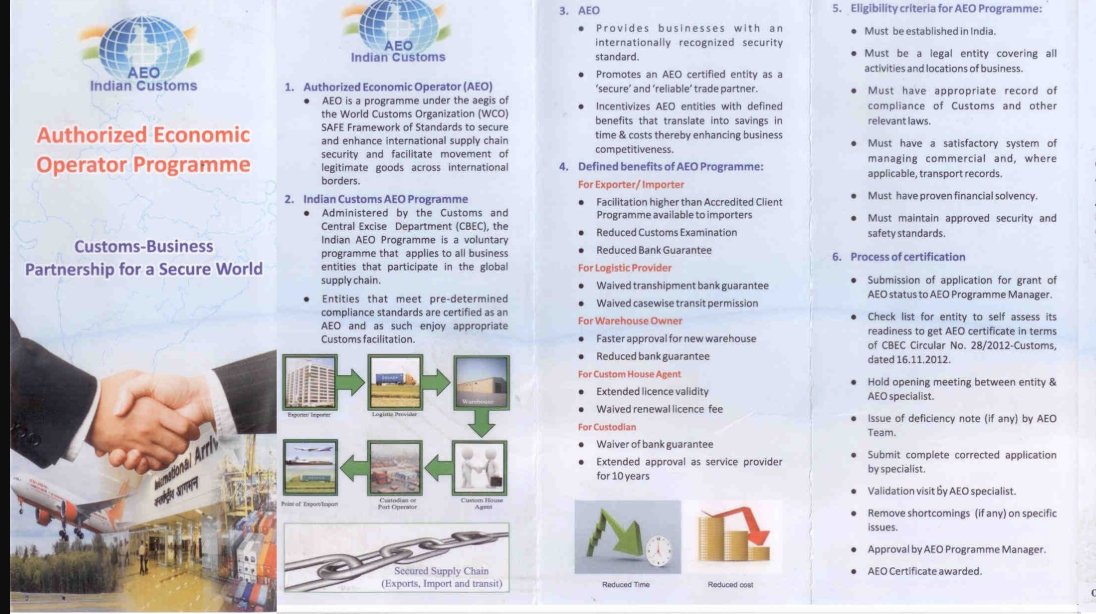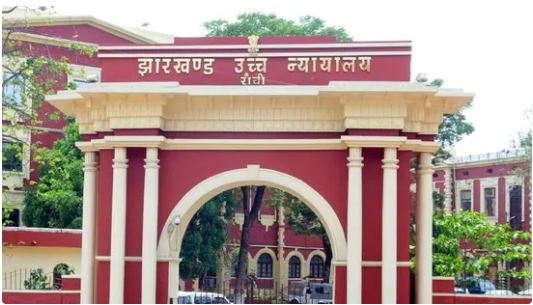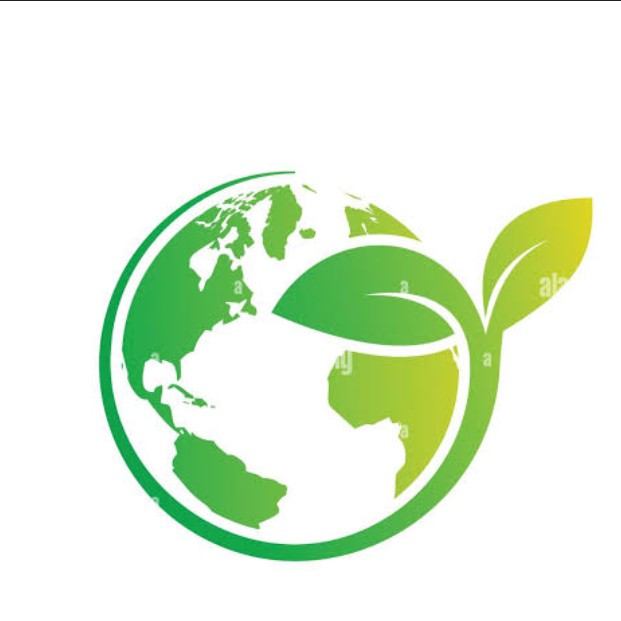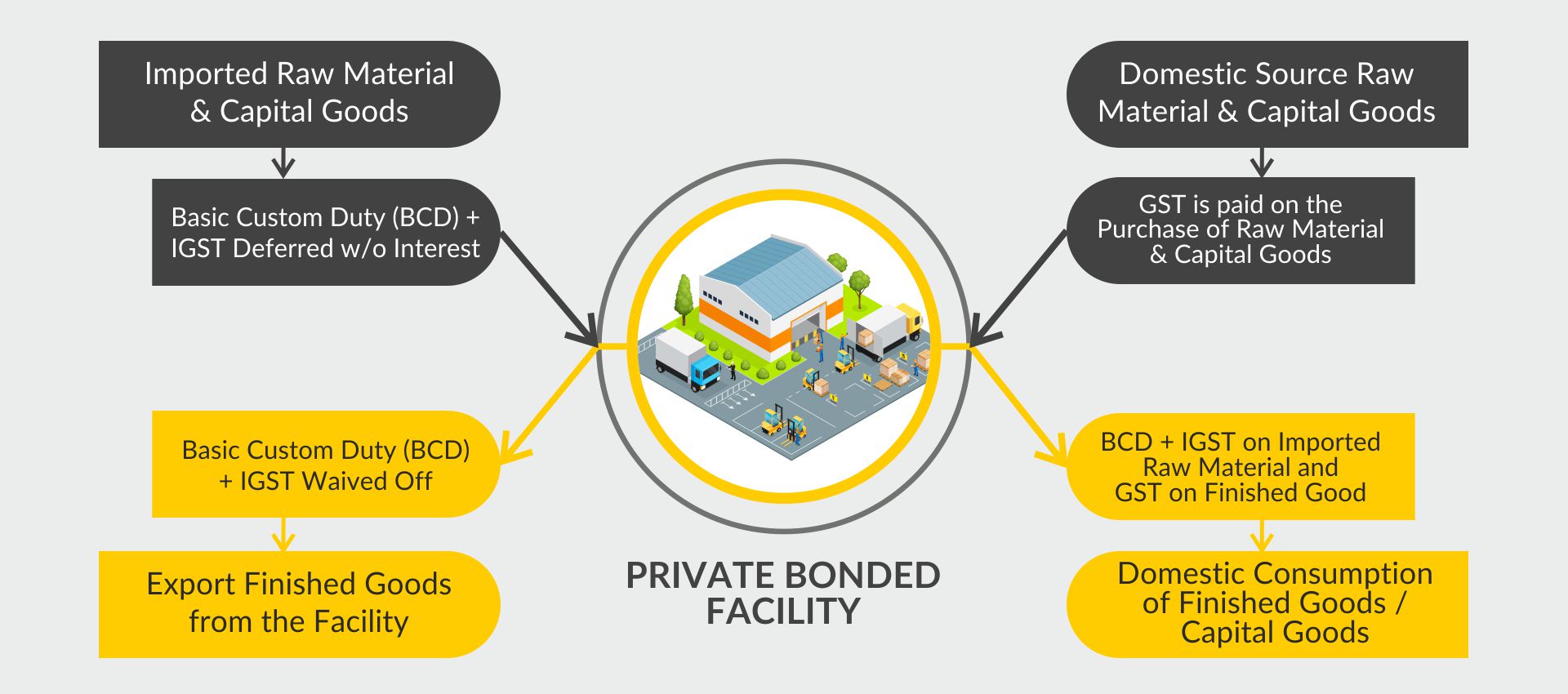Your cart is currently empty!
Our Prominent Clients


Dated: 26.09.2019
AUTHORIZED ECONOMIC OPERATORS PROGRAM-INDIAN CUSTOMS
What is AEO Program
According to the World Customs Organization (WCO), an authorized economic operator (AEO) is a party involved in the international movement of goods in whatever function that has been approved by or on behalf of a national Customs administration as complying with WCO or equivalent supply chain security standards. Authorized Economic Operators include inter alia manufacturers, importers, exporters, brokers, carriers, consolidators, intermediaries, ports, airports, terminal operators, integrated operators, warehouses and distributors
The growth of global trade and increasing security threats to the international movement of goods have forced customs administrations to shift their focus more and more to securing the international trade flow and away from the traditional task of collecting customs duties. Recognizing these developments, the WCO, drafted the WCO Framework of Standards to Secure and Facilitate global trade (SAFE). In the framework, several standards are included that can assist Customs administrations in meeting these new challenges. Developing an Authorized Economic Operator programme is a core part of SAFE.
The WCO framework of standards
The AEO concept is one of the main building blocks within the WCO SAFE Framework of Standards (SAFE). The latter is part of the future international Customs model set out to support secure trade. SAFE sets out a range of standards to guide international Customs Administrations towards a harmonised approach based on Customs to Customs cooperation and Customs to Business partnership.
SAFE is based on four core elements:
- harmonization of the advance electronic cargo information
- each country that joins SAFE commits to employing a consistent risk management approach to address security threats
- on request of the Customs administration of the receiving nation, the customs administration of the sending nation will perform an outbound inspection of high-risk containers and cargo
- definition of benefits that Customs will provide to businesses that meet minimal supply chain security standards and best practices.
The essence of the AEO-concept can be found in the Customs-to-Business partnerships. Operators can be accredited by Customs as AEOs when they prove to have high quality internal processes that will prevent goods in international transport to be tampered with. I.e.:
- Ensure the integrity of the information, i.e. what is said to be in a container, really is in the container and nothing else, more, or less;
- Ensure the integrity of its employees, that they will not put goods in the container that should not be there; and
- Secure access to its premises, to prevent unauthorised persons to put goods in the container.
As a result, customs will trust the operator and perform less or no inspections on goods imported or exported by or via the AEO. This benefit’s the mover of the goods as goods is available more quickly, which means lower transport costs. Customs benefits as scarce inspection capacity can be targeted better at cargo of unknown and potentially unsafe operators.
Prior to adoption of the SAFE Framework by WCO in 2005, Customs administrations all over the world, including India, were already implementing various forms of Customs compliance programmes which focused on compliance with traditional areas of Customs requirements, and which can also be considered as trade facilitation programmes, based on the Revised Kyoto Convention’s “authorized persons” provisions. In India, this programme was known as Accredited Client Programme (ACP). On the other hand, Article 7.7 (Trade Facilitation Measures for Authorized Operators) of the WTO Trade Facilitation Agreement (TFA) also provides for implementation of “Authorized Operator” scheme on the basis of international standards, where such standards exist.
In the light of these international developments, as well as in view of the focus of the Government of India on “Ease of Doing Business”, it is imperative to develop a comprehensive unified trade facilitation programme by incorporating the existing ACP scheme and ongoing AEO programme into a revised AEO programme providing additional facilities to the legitimate trade who have demonstrated strong internal control system and willingness to comply with the laws administered by the Central Board of Excise and Customs. The objective of the revised AEO Programme shall continue to remain same as earlier that is to provide businesses with an internationally recognized quality mark which will indicate their secure role in the international supply chain and that their Customs procedures are efficient and compliant. An entity with an AEO status can, therefore, be considered a ‘secure’ trader and a reliable trading partner.
Three tier AEO programme for importers and exporters (AEO-T1, AEO-T2, and AEO-T3)
It has been decided that the existing ACP and AEO programmes will be merged into this new AEO programme. For the economic operators other than importers and the exporters, the new programme offers only one tier of certification (i.e. AEO-LO) whereas for the importers and the exporters, there will be three tiers of certification (i.e. AEO-T1, AEO-T2 and AEO-T3). Accordingly, henceforth the AEO Programme Manager may, following an application by an economic operator, issue the following Authorized Economic Operator Certificates (hereinafter referred to as AEO certificates)to which the applicant may be eligible as per the eligibility conditions and criteria laid down under paragraph 3 of this circular:
AEO-T1Certificate– This certificate may be granted only to an importer or to an exporter.
For the purpose of this certificate,
- the Importer/ Exporter should fulfil the criteria mentioned at para 3.1 below; and
- All other requirements as stipulated in paragraphs 3.2, 3.3 and 3.4 below shall be considered to have been met if the information and documents submitted by the applicant prove the claims of the applicant to the satisfaction of the AEO Programme Manager.
AEO-T2 Certificate– This certificate may be granted only to an importer or to an exporter
For the purpose of this certificate,
- the economic operator should fulfill the criteria mentioned at para 3.1 below; and
- all other requirements as stipulated in paragraphs 3.2, 3.3, 3.4 and 3.5 below shall be considered to have been met if the claims made in this regard in information and documents submitted by the applicant have been physically verified by the AEO Programme Team by visiting the concerned places/premises of the applicant, on the dates decided by mutual consent by the team and the applicant, and found to be true to the satisfaction of the AEO Programme Manager.
AEO-T3 Certificate – This certificate may be granted only to an importer or to an exporter.
For the purpose of this certificate,
- The economic operator must have continuously enjoyed the status of AEO-T2 for at-least a period of two years preceding the date of application for grant of AEO-T3 status; or
- The economic operator must be an AEO-T2 certificate holder, and its other business partners namely importers or exporters, Logistics service providers, Custodians/Terminal operators, Customs Brokers and Warehouse operators are holders of AEO-T2or AEO-LO certificate or any other equivalent AEO certificate granted by a foreign Customs.
Single Tier AEO Programme for Logistics Providers, Custodians or Terminal Operators, Customs Brokers and Warehouse Operators
AEO-LO Certificate– This certificate may be granted to categories of economic operators other than importers and exporters, namely Logistics Providers, Custodians or Terminal Operators, Customs Brokers and Warehouse Operators.
For the purpose of this certificate,
- the economic operator should fulfil the criteria mentioned at para 3.1 below; and
- all other requirements as stipulated in paragraphs 3.2, 3.3, 3.4 and 3.5 below shall be considered to have been met if the claims made in this regard in information and documents submitted by the applicant have been physically verified by the AEO Programme Team by visiting the concerned places/premises of the applicant, on the dates decided by mutual consent by the team and the applicant, and found to be true to the satisfaction of the AEO Programme Manager.
Benefits of an AEO Certificate
The scope of the benefits to the AEOs based on their categories would be as mentioned below:
Benefits for AEO-T1:
- They shall be accorded high level of facilitation in imports and export of their consignments, thereby ensuring shorter cargo release time.
- Facility of Direct Port Delivery (DPD) of their import Containers and/ or Direct Port Entry (DPE) of their Export Containers would be available to them. However, this facility will be dependent on the volume of their Import/ Export trade in terms of number of containers.
- ID cards to be granted to authorized personnel for hassle free entry to Custom Houses, CFSs and ICDs.
- Wherever feasible, they will get separate space earmarked in Custodian’s premises.
- In case they are required to furnish a Bank Guarantee, the quantum of the Bank Guarantee would be 50% of that required to be furnished by an importer/ exporter who is not an AEO Certificate Holder. However, this exemption fromBank guarantee wouldnot be applicable in cases where the Competent Authority orders furnishing of Bank Guarantee for provisional release of seized goods.
- Investigations, if any, in respect of Customs, Central Excise and Service Tax cases would be completed, as far as possible, in six to nine months.
- Dispute resolution at the level of Adjudicating Authorities in respect of Customs, Central Excise and Service Tax cases would be done preferably and as far as possible within six months.
- They will not be subjected to regular transactional PCA, instead of that onsite PCA will be conducted once in two years only.
- They will get an e-mail regarding arrival/ departure of the vessel carrying their consignments.
- 24/7 clearances on request at all sea ports and airports – No Merchant Overtime Fee (MOT) charges need to be paid.
Benefits for AEO-T2:
The following benefits would be provided over and above the benefits offered in T1:
- They shall be accorded higher level of facilitation (as compared to AEO-T1 in imports and export of their consignments.
- For Importers/Exporters not opting for DPD/DPE, seal verification/scrutiny of documents by Custom officers would be waived. Consignments would be given out of charge or let export order, as the case may be, without any scrutiny by the officers.
- The containers selected for scanning will be scanned on priority, by giving front line of treatment.
- Facility of deferred payment of duty will be provided, from a date to be notified
- Faster disbursal of drawback amount within 72 hours of EGM submission, from a date to be notified
- The BEs/SBs selected for Assessment and/or Examination will be processed on priority by the Customs officers.
- Facility of self -sealing of export goods would be allowed without the requirement to seek case to case base permission from the authorities
- Faster completion of Special Valuation Branch (‘SVB’) proceedings in case of related party imports and monitoring of such cases for time bound disposal in terms of new guidelines
- In case they are required to furnish a Bank Guarantee, the quantum of the Bank Guarantee would be 25% of that required to be furnished by an importer/ exporter who is not an AEO Certificate Holder. However, this exemption from Bank guarantee would not be applicable in cases where the Competent Authority orders furnishing of Bank Guarantee for provisional release of seized goods.
- They will be given facility to paste MRP stickers in their premises.
- They will not be subjected to regular transactional PCA instead of that onsite PCA will be conducted once in three years only.
- They will be given access to their consolidated import/export data through ICEGATE from a date that would be communicated separately.
- They will be provided the facility of submitting paperless declarations with no supporting documents in physical form.
- All Custom Houses will appoint a “Client Relationship Manager”(CRM) at the level of Deputy / Assistant Commissioner as a single point of interaction with them. The CRM would act as voice of the AEO within Customs in relation to legitimate concerns and issues of AEO and would assist in getting procedural and operational issues resolved by coordinating with different sections within Customs as well as other stakeholders.
- The refund/Rebate of Customs/Central Excise duty and Service Tax would be granted within 45 days of the submission of complete documents.
- They will get trade facilitation by a foreign Customs administration with whom India enters into a Mutual Recognition Agreement/Arrangement.
Benefits for AEO-T3:
The following benefits would be provided over and above the benefits offered in T2:
- They shall be accorded highest level of facilitation, as compared to AEO-T2, in imports and export of their consignments.
- Their containers will not be selected for scanning except on the basis of specific intelligence. Further when any container is selected for scanning, top most priority will be given for scanning.
- The assessing/examining custom officer will rely on the self-certified copies of documents submitted by them without insisting upon original documents.
- They would not be required to furnish any Bank Guarantee. However, this exemption from Bank guarantee would not be applicable in cases where the Competent Authority orders furnishing of Bank Guarantee for provisional release of seized goods.
- An approach based on Risk based interventions, in case of requirements originating from the Acts administered by other Government Agencies/Departments, will be adopted for providing better facilitation in imports and export of their consignments.
- On request, they will be provided on-site inspection /examination.
- The refund/Rebate of Customs/Central Excise duty and Service Tax would be granted within 30 days of the submission of complete documents.
Benefits for AEO-LO:
| SL No | Entity | Facilities to be provided | ||||
| 1 | Logistic Service Provider | (a) Waiver of bank Guarantee in case of trans-shipment of goods under Goods imported (Condition of Trans-shipment) Regulations, 1995. | ||||
| (b) Facility of Execution of running bond. | ||||||
| (c) Exemption from permission on case to case basis in case of transit of goods. In case of international transhipped cargo (Foreign to Foreign), for the pre-sorted containers wherein Cargo does not require segregation, ramp to ramp or tail to tail transfer of cargo can be effected without Customs escorts. | ||||||
| 2 | Custodians or Terminal Operators | (a) Waiver of bank Guarantee under Handling of cargo in Customs Area Regulations 2009. | ||||
| (b)Extension of approval for custodians under regulation 10(2) of the ‘Handling of cargo in Customs Area Regulation 2009 ‘for period of 10 years. | ||||||
|
Customs Brokers | (a) Waiver of Bank Guarantee to be furnished under regulation 8 of the CBLR, 2013. |
||||
| (b) Extended validity (till validity of AEO status) of licenses granted under regulation 9 of the CBLR 2013. System Manager to incorporate date of validity of AEO from time to time in the System Directory | ||||||
| (c) Waiver from fee for renewal of license under sub regulation (2) of regulation 11 of CBLR,2013. | ||||||
| 4 | Warehouse Operators | (a) Faster approval for new warehouses within 7 days of submission of complete documents | ||||
| (b) Waiver of antecedent verification envisaged for grant of license for warehouse under circular 26/2016 | ||||||
| (c) Waiver of solvency certificate requirement under circular 24/2016 | ||||||
| (d) Waiver of security for obtaining extension in warehousing period under circular 21/2016 | ||||||
| (e) Waiver of security required for warehousing of sensitive goods under circular 21/2016 | ||||||
With a view to promote an overall voluntary compliance framework, the selection of AEO’s for on-site post clearance audit (OSPCA) in respect of AEO-T1, AEO-T2 and AEO-T3 shall be based on risk assessment. Better and higher compliance level demonstrated by the AEO shall be taken into account for determining the frequency of audit. It is also clarified that AEO’s undergoing OSPCA shall not be subjected to routine transactional PCA. Detailed guidelines on risk based OSPCA will be issued subsequently.
Eligibility conditions and criteria for granting the AEO certificate
Who can apply for AEO certificate?
Anyone involved in the international supply chain that undertakes Customs related activity in India can apply for AEO status irrespective of size of the business. These may include exporters, importers, logistic providers (e.g. carriers, airlines, freight forwarders, etc.), Custodians or Terminal Operators, Customs House Agents and Warehouse Owners. Others who may qualify include port operators, authorized couriers, stevedores. The list is not exhaustive.
Businesses that are not involved in Customs related work / activities will not be entitled to apply. This means that in general, banks, insurance companies, consultants and the like categories of businesses will not be eligible for AEO status.
Application for AEO status will only cover the legal entity of the applicant and will not automatically apply to a group of companies.
There is no provision to grant AEO status to specific site, division or branch of legal entity of the applicant. The application must cover all the activities and locations of the legal entity involved in the international supply chain and the prescribed criteria will be applied across all those activities and locations.
In order to apply for AEO status the applicant must be established in India. For this purpose, the applicant should provide evidence which may include:
- A certificate of registration issued by the Registrar of Companies.
- Details of places/locations where goods are being handled, e.g. loading, unloading, storage etc., in the course of supply to/from international supply chain.
- Proof that the business has its own accounts.
The applicant should have business activities for at least three financial years preceding the date of application. However in exceptional cases, on the basis of physical verification of internal controls of a newly established business entity, the AEO Programme Manager may consider it for certification.
Keeping the small and medium scale enterprises in mind it has been decided the AEO programme is made open to all Importers/Exporters whose threshold of import or export declarations is 25 documents i.e. either Bills of Entry or Shipping Bills during the last financial year. The other economic operators should have handled at least 25 documents i.e. Bills of Entry or Shipping bills during the last financial year.
An AEO status applies only to the legal entity applying for such status in its own capacity and covering its role in the international supply chain. Therefore, AEO status can be granted to a Customs Broker, but this will not confer similar status on its client importers / exporters who will need to apply separately for that status.
The AEO Programme is open to all economic operators, including micro, small and medium enterprises (MSMEs) and the eligibility conditions and criteria for granting the AEO Certificates are the same for all economic operators regardless of their size. However, the AEO Programme Manager shall take due account of the specific characteristics of economic operators, in particular of MSMEs, while applying the eligibility conditions and criteria prescribed (relating to management of commercial and transport records), and those under relevant clauses (relating to safety and security) for granting the above AEO Certificates. The AEO Programme Manager shall take into account such factors as the size of the MSMEs, the legal status (e.g. proprietorship, partnership etc), the structure, the key business partners and also the specific economic activity of the economic operator while applying these eligibility conditions and criteria specified. In particular, the AEO Programme Manager shall take into account the possible difficulties for MSMEs in meeting with these eligibility conditions and criteria with a view to make the above AEO certificates more available to MSMEs. The criteria of turnover indicated in MSME Act would be taken into consideration for categorization of entities into Micro, Small and Medium Enterprises.
Important Factors to plan before applying for AEO Certificate are listed below:
- Legal Compliance
- Managing commercial and (where appropriate) transport records
- Financial solvency
- Safety and security
- Procedural Security
- Premises Security
- Cargo Security
- Conveyance Security
- Personnel Security
- Business Partner Security
- Security Training and Threat Awareness
Renewal of AEO certificate
The AEOs, if they so desire to continue their AEO status and avail the benefits, must submit their application as stipulated under Section 2 of this circular, before lapse of their validity as per the following-
| AEO status | Time limit for submission of application for renewal before lapse of validity | |
| AEO-T1 | 30 days | |
| AEO-T2 | 60 days | |
| AEO-T3 | 90 days | |
| AEO-LO | 90 days |

Download the Revised Customs Notification from below link
Customs Circ 03-2018-AEO Amendment
Customs Circular 33-2016 Revised
Customs Circular 28-2012
For further facilitation to obtain AEO Program Certificate please contact undersigned
Courtesy:
M/s S.J. EXIM Services- Q-Freight Team
Contact Person: Ravi Shekhar Jha
Mob: +91-9999005379
Web: www.sjeximtech.com / www.q-freight.com
Email: intelconsul@gmail.com / ravi.jha@q-freight.com
Disclaimer: Please refer to official sources before effecting a decision
Hello,
I’m Mimansa

Welcome to SJ EXIM, your corner of the internet dedicated to all things related to Indirect tax I Customs I Arbitration I Insolvency Advisory in India. Let’s craft a solution for you! Connect via email…..
Let’s connect
Follow our Updates/News!
Stay updated & join our newsletter.
















Leave a Reply